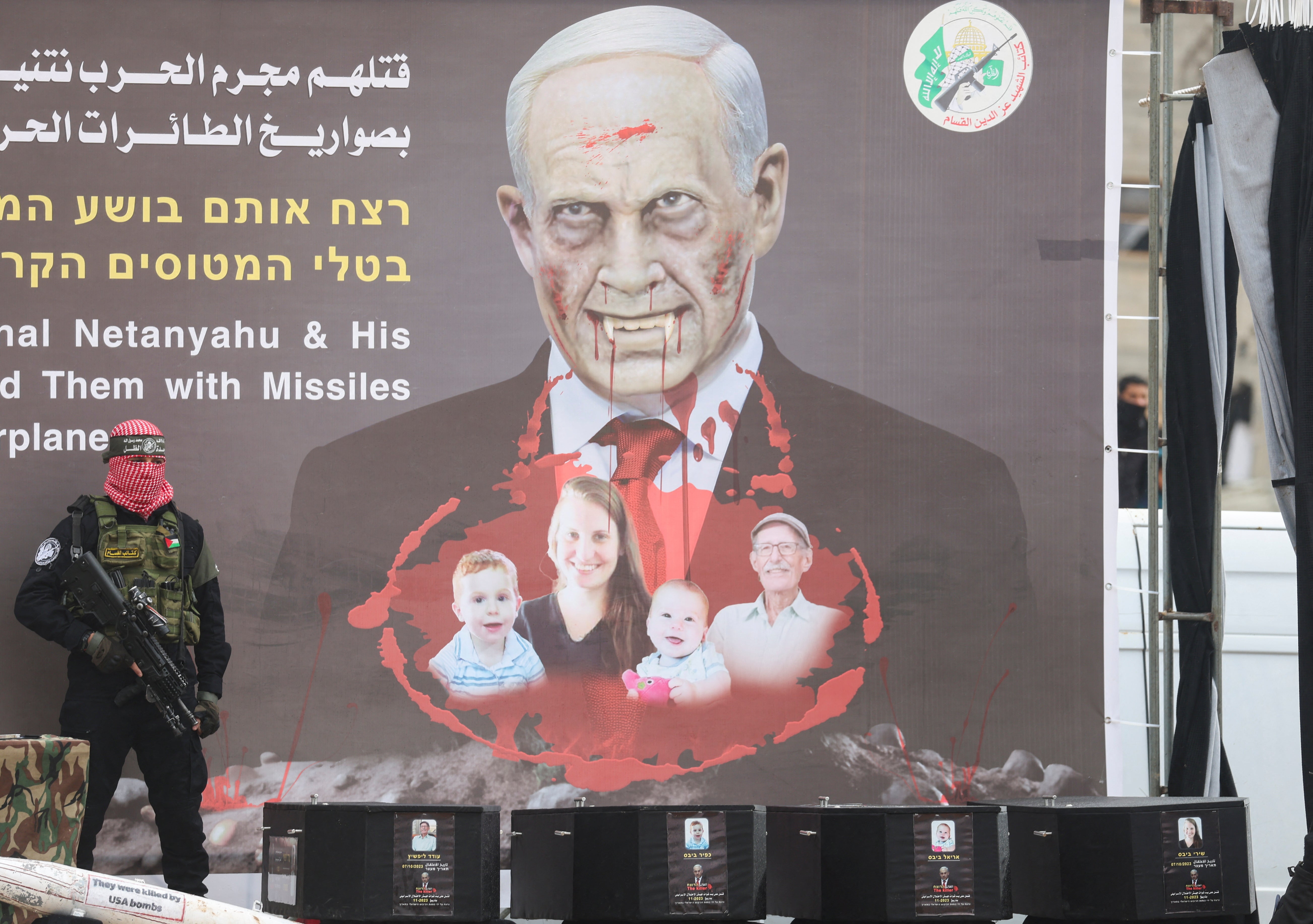How will the Hamas hostage handover spectacle affect the politics of peace?
After the grim display put on by the group as it returned the bodies of hostages, it appears increasingly unlikely that Hamas can play any formal role in the governance of Gaza, writes Sean O’Grady – though equally unlikely that it can ever be completely destroyed

Hamas has handed over the remains of four Israeli hostages taken during the atrocities committed by the group on 7 October 2023. The circumstances of their abduction and what then ensued were horrific, even by the standards of this conflict.
The remains are of Shiri Bibas and her two sons – Ariel, four, and Kfir, a nine-month-old baby – and Oded Lifshitz, an 83-year-old retired journalist and peace campaigner. Shiri’s husband, Yarden Bibas, was kidnapped separately and released this month after 16 months in captivity, having been told by Hamas that his wife and children were dead.
Their respective backgrounds underline the cruel and indiscriminate nature of the Hamas action. In the words of the president of Israel, Isaac Herzog, “The hearts of an entire nation lie in tatters”, and many more across the whole world are appalled once again.
The way the bodies were returned added to the horror. It is looking increasingly unlikely that Hamas can play any formal role in the governance of Gaza, though equally unlikely that the group, or a proxy successor, can ever be completely destroyed.

Does Hamas care about the way these hostage returns are conducted?
Yes, but not in a way that serves the group well. As with previous exchanges, Hamas sought to exploit things for their own propaganda purposes, with a show of strength by masked gunmen. On this occasion, some mock rockets labelled with the message “They were killed by USA bombs” were placed by the coffins. Behind them was a crude poster depicting Israeli prime minister Benjamin Netanyahu as a vampire.
Hamas claims the hostages died in Israeli bombings, but this has not been proven (and of course they’d still be alive if they’d not been taken by the terrorists).
Who are Hamas?
Hamas stands for “Harakat al-Muqawama al-Islamiya”, which means the Islamic Resistance Movement. It was founded in 1987 as an offshoot of the Palestinian Muslim Brotherhood. In 2006 it won power in elections as Israeli troops withdrew from Gaza; no further votes have been held. Practically speaking, its policy appears to be the creation of a Palestinian state within the 1967 borders, without recognising the state of Israel.
Is it true that Hamas is dedicated to the destruction of Israel, and of all Jewish people?
The group’s rhetoric about a Palestinian state “from the river to the sea” and other statements does indicate that. In any case, and whatever the historical context, its members are evidently terrorists prepared to take the lives of Israeli and other civilians.
What about the Palestinian people?
What is also true is that Hamas cares little about the welfare of the Palestinian people, in Gaza or elsewhere. It knew the 7 October attacks would invite Israeli military action, with unpredictable but certainly deadly consequences for Gaza. The aim was somehow to try to draw Iran, Hezbollah, Yemeni Houthi rebels and America into conflict, thus destabilising the region and upending Israel’s security and support in the international community. From Hamas’s standpoint, the greater the loss of innocent civilian life, the better for its cause.
Hamas clearly did succeed in derailing the Abraham Accords process. This was the plan, pioneered by Donald Trump in his first term, to have Arab nations across the region conclude a series of peace treaties with Israel. Morocco, Sudan, Bahrain and the United Arab Emirates all signed up in 2020 and 2021, but since the war broke out, progress with Saudi Arabia, most importantly, has been stalled, and relations with other Arab states have been strained.
Does the return of remains help Netanyahu politically?
It is further progress towards the goal of the liberation of all the captives, and maintains the ceasefire. However, Netanyahu remains relatively unpopular because of his longer-term failure to return the hostages, and that trauma continues.
What does the future hold for Hamas?
It is fairly bleak. Militarily, the war went badly for the group, as well as for its mentors in Iran and Iran’s proxies in the region, because Israel’s anti-missile defences and offensive capability were far more effective than anticipated. Partly as a result, Hezbollah was unable and unwilling to join with Hamas, and Hezbollah ended up being pinned back in its southern Lebanese strongholds. Many of Hamas’s top civilian and military personnel were assassinated, though they were swiftly replaced.
Much obviously depends on the fate of the Trump plan to move 2 million Gazans to new homes in Jordan, Egypt or elsewhere. Perhaps the Arab states’ plan for Gaza will succeed; but in any case Israel, backed by the US, cannot countenance Hamas being a governing party again. Equally, Hamas won’t disband or surrender, and the war has created many new recruits for the organisation.
Join our commenting forum
Join thought-provoking conversations, follow other Independent readers and see their replies
Comments